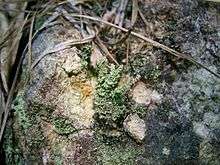Cladoniaceae
The Cladoniaceae are a family of lichenized fungi in the order Lecanorales.[2] The reindeer moss and cup lichens (Cladonia) belong to this family. The latter genus, which comprises about 400 species, forms a major part of the diet of large mammals in taiga and tundra ecosystems.[3]
| Cladoniaceae | |
|---|---|
 | |
| Cladonia sobolescens | |
| Scientific classification | |
| Kingdom: | Fungi |
| Division: | Ascomycota |
| Class: | Lecanoromycetes |
| Order: | Lecanorales |
| Family: | Cladoniaceae Zenker (1827)[1] |
| Type genus | |
| Cladonia P.Browne (1756) | |
Genera
- Calathaspis
- Carassea
- Cetradonia
- Cladia
- Cladonia
- Gymnoderma
- Heterodea
- Heteromyces
- Metus
- Myelorrhiza
- Notocladonia
- Pilophorus
- Pycnothelia
- Sphaerophoropsis
- Squamella
- Thysanothecium
gollark: Unicode!
gollark: ++delete あぼーん
gollark: ++list_deleted Lyric
gollark: ++delete <@319753218592866315>
gollark: I should fix my search engine.
References
- Goebel F; Kunze, G (1827). Pharmaceutische Waarenkunde (in German). Eisenach: J.F. Bärecke. p. 124.
- Lumbsch TH, Huhndorf SM (December 2007). "Outline of Ascomycota – 2007". Myconet. Chicago, USA: The Field Museum, Department of Botany. 13: 1–58. Archived from the original on 2009-03-18. Retrieved 2014-11-15.
- Cannon PF, Kirk PM (2007). Fungal Families of the World. CAB International. p. 73. ISBN 978-0-85199-827-5.
This article is issued from Wikipedia. The text is licensed under Creative Commons - Attribution - Sharealike. Additional terms may apply for the media files.